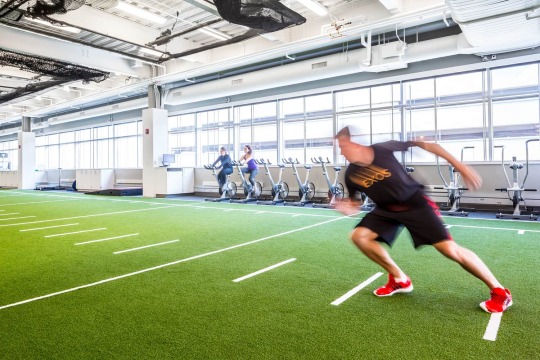Don't wanna be here? Send us removal request.
Text
Top 12 Qualities That Make An Effective Physiotherapist
Physiotherapists play a critical role in helping individuals recover from injuries, manage chronic conditions, and improve their overall physical well-being. When seeking the services of a physiotherapist, it's essential to identify what makes an effective practitioner. An effective physiotherapist possesses a unique set of qualities, skills, and attributes that contribute to successful patient outcomes.

Key Elements That Make An Effective Physiotherapist
1. Empathy and Compassion
Effective physiotherapists must be empathetic and compassionate. They deal with patients who may be in pain or facing physical challenges, and showing understanding and empathy can create a supportive and nurturing environment. Compassion is crucial for building trust and rapport with patients.
2. Strong Communication Skills
Clear and effective communication is essential in the field of physiotherapy. Physiotherapists need to explain complex medical concepts, exercise routines, and treatment plans in a way that patients can understand. They must also be active listeners, paying close attention to their patients' concerns and questions.
3. Patience
Patience is a virtue for a physiotherapist. Patients may progress at different rates, and it's essential for physiotherapists to remain patient and encouraging throughout the rehabilitation process. They should be willing to adapt treatment plans as needed and provide ongoing support.
4. Clinical Knowledge and Expertise
An effective physiotherapist possesses a strong foundation of clinical knowledge and expertise. They are well-versed in anatomy, biomechanics, and the latest developments in physiotherapy. This knowledge enables them to make accurate assessments and design appropriate treatment plans.
5. Problem-Solving Abilities
According to the experts at LiveActive Sport Medicine, in physiotherapy, every patient presents a unique set of challenges. Effective physiotherapists are skilled problem-solvers who can adapt their approaches to address the specific needs and goals of each patient. They use critical thinking to determine the most suitable treatment strategies.
6. Manual Dexterity
Many physiotherapy techniques require hands-on treatment. Physiotherapists need good manual dexterity to perform manual therapy, massage, joint mobilization, and other physical interventions effectively. They must be skilled in applying pressure and manipulating muscles and joints with precision.
7. Adaptability
Healthcare is an evolving field, and physiotherapists must stay up-to-date with the latest research and technologies. Effective physiotherapists are adaptable and open to incorporating new techniques and approaches into their practice. They are committed to lifelong learning and professional development.
8. Motivational Skills
Motivation is a powerful tool in physiotherapy. Effective physiotherapists motivate their patients to actively participate in their rehabilitation, adhere to exercise regimens, and make lifestyle changes that promote recovery. They inspire and encourage their patients throughout the healing process.
9. Observation Skills
Observation is a key component of physiotherapy. Effective physiotherapists possess keen observational skills, allowing them to assess a patient's posture, movement, and physical limitations accurately. These observations guide their treatment plans and adjustments.
10. Respect for Patient Autonomy
While physiotherapists provide guidance and recommendations, they also respect their patients' autonomy and preferences. Effective physiotherapists collaborate with their patients to set achievable goals and make shared decisions about their treatment plans.
11. Teamwork
Physiotherapy in Downtown Toronto often involves collaboration with other healthcare professionals, such as doctors, nurses, and occupational therapists. Effective physiotherapists are team players who can communicate and work cohesively with other members of the healthcare team to provide comprehensive patient care.

12. Ethics and Professionalism
Ethical behavior and professionalism are non-negotiable for physiotherapists. They must adhere to a strict code of ethics, maintaining patient confidentiality and the highest standards of professional conduct. Patients must trust their physiotherapists implicitly. Check this link to learn more.
An effective physiotherapist possesses a diverse set of qualities and attributes that extend beyond clinical expertise. They combine education, empathy, communication skills, clinical expertise, patience, manual dexterity, and motivation to provide individualized care that fosters recovery and enhances their patients' quality of life. Effective physiotherapists adapt to evolving practices and respect patient autonomy, creating a therapeutic partnership that is essential for successful rehabilitation and well-being.
0 notes
Text
How to Choose the Right Sports Medicine Clinic as an Athlete
When it comes to sports-related injuries or conditions, seeking the expertise of a specialized sports medicine clinic is crucial. These clinics offer comprehensive care and tailored treatment plans to athletes and individuals engaged in physical activities. However, choosing the right sports medicine clinic requires careful consideration.

Tips When Choosing a Sports Medicine Clinic
Assess Your Specific Needs
Begin by assessing your specific needs and goals. Are you seeking treatment for a sports-related injury, rehabilitation, or performance enhancement? Experts at LiveActive Sport Medicine explain that understanding your unique requirements will help you identify clinics that specialize in the services you need. Consider factors such as the type of sports medicine practitioners available, the clinic's focus areas, and the range of services they offer.
Research and Credentials
Conduct thorough research on the sports medicine clinics in your area. Look for clinics that have a strong reputation and positive patient reviews. Check the credentials and qualifications of the clinic's practitioners, including doctors, physical therapists, and other specialists. Ensure that the clinic has board-certified sports medicine physicians and staff who specialize in treating sports-related conditions.
Specializations and Services
Evaluate the specializations and services offered by the sports medicine clinic in Downtown Toronto you are considering. Do they have expertise in treating specific injuries or conditions relevant to your needs? Look for clinics that offer a comprehensive range of services, including injury diagnosis and treatment, physical therapy, rehabilitation programs, sports performance enhancement, and preventive care. Choosing a clinic that provides a holistic approach to sports medicine ensures that all aspects of your athletic health are addressed.
Facility and Equipment
The quality of the facility and equipment is an important consideration. A well-equipped clinic with state-of-the-art technology and modern facilities can significantly enhance the diagnosis, treatment, and overall patient experience. Look for clinics that invest in advanced equipment and have dedicated spaces for specialized treatments, such as rehabilitation gyms or performance testing labs.
Communication and Collaboration
Choose a sports medicine clinic that emphasizes clear communication and collaborative care. The clinic should have a patient-centered approach, where practitioners actively listen to your concerns, answer your questions, and involve you in the decision-making process. Effective communication and collaboration foster trust, enabling you to actively participate in your treatment plan and achieve the best possible outcomes.
Location and Convenience
Consider the location and convenience of the sports medicine clinic. Opt for a clinic that is easily accessible and located in close proximity to your home or workplace. This will minimize travel time and make it more convenient for you to attend appointments or rehabilitation sessions. Additionally, check the clinic's hours of operation to ensure they align with your schedule.

Patient Testimonials and Referrals
Review patient testimonials and seek referrals from trusted sources. Hearing about others' experiences with a particular sports medicine clinic can provide valuable insights into the quality of care and patient satisfaction. Ask your primary care physician, friends, or teammates for recommendations, as personal referrals can offer a level of trust and confidence in your choice. Visit here to learn more.
Choosing the right sports medicine clinic is essential for receiving optimal care and achieving a successful recovery from sports-related injuries or conditions. By considering expertise and specialization, comprehensive services, reputation and recommendations, facility and technology, collaboration and multidisciplinary approach, insurance coverage and financial considerations, as well as patient-centered care and communication, you can make an informed decision when selecting a sports medicine clinic. Prioritize your health and well-being by choosing a clinic that meets your specific needs and helps you get back in the game with confidence.
1 note
·
View note